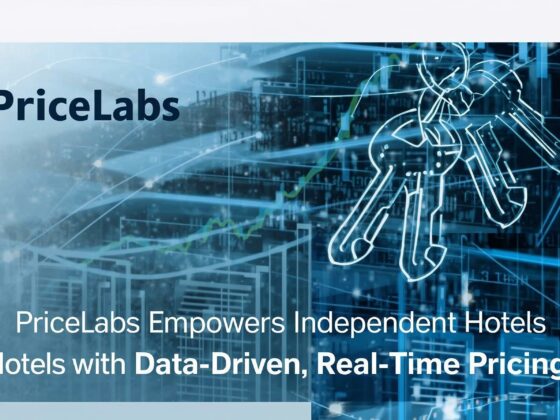Search is going to zero-click and what that means for marketing analytics. Generational travel vs Stage-of-life travel. Tips for vendors to sell to the hospitality industry.
Hello,
It’s thanksgiving weekend, one of the few times the US takes a break. I’m secretly hoping that means they’ll have plenty of time to read my newsletter. But, I think they’re all out shopping great deals. But you’re not 🙂 enjoy the read, and don’t forget to forward this newsletter to a friend.
Best, Martin
Exceptional Black Friday deals from Klairhaus. Keyboard and screen brushes, hand crafted cork decorations.
Support the newsletter, treat yourself to great office gadgets.
Airbnb goes counter culture: “No AI”
Last week Airbnb announced they aren’t doing an AI chatbot. A fresh take on the tired AI Chatbot fad that is currently going around the world. Airbnb says they tried the chatbot and it wasn’t right. I tend to agree to some degree. And they might just feed their inventory to OpenAI and get them to drive the reservations with their upcoming search product. But since Wall Street is rushing to everything AI these days, I can’t help but wonder if this is Airbnb trying to work up some hype without an AI product. If AI is a massive autocomplete, then where can it truly help in the hotel booking funnel? Inspiration is definitely something. But I think inspiration doesn’t happen on Airbnb really. Most people know where they want to go by the time they’re booking a house on Airbnb.
NO CHATBOT FOR AIRBNB
AI hotel agents and hotel bookings
Bookline.io, HotelPlanner.ai and others introduced AI-powered booking agents that can converse in multiple languages, managing thousands of calls daily. The use of AI in customer service and reservations is brilliant. Some stats claim that 22% of bookings today are still done on calls. The thing I wonder is how this works when the booking is not following a regular path. Guests call because they need something special, the regular booking can be done on the website, the calls are because they need wheelchair access connecting rooms etc. And the website isn’t clear about that. But will the AI agent be? How frustrated will the guest be if the call is as ambiguous (or wrong) as the website? Or is this just not a real problem?
VOICE AI IN HOTELS
About me: I'm a fractional CMO for large travel technology companies helping turn them into industry leaders. I'm also the co-founder of 10minutes.news a hotel news media that is unsensational, factual and keeps hoteliers updated on the industry. The devolution of Google search
The European DMA is throwing a spanner in the works of Google’s search plans. I guess that was always the plan, to throw up a bunch of imprecise, big picture regulations, squint and see where the cards land. Google is announcing that they are pulling search pages back to 10 blue links (paid or not paid?) in Germany, Belgium and Estonia. German hotel associations say this will penalize hotels. The jury is out as to who will benefit most on this, it seems it will be OTAs but so far the numbers aren’t really conclusive either way. Search is in the early phase of being disrupted, either by anti-trust cases or by AI search and we’re moving to zero-click search (more below).
GOOGLE HOTEL SEARCH
Generational travel? or Stage-of-life travel?
For some reason marketing people love the idea of generational habits and “Gen-Z travel trends” or similar headlines. While there are some truths in generational shifts such as with/without internet, smartphones etc. I find it is much harder to market travel to those categories. Stage-of-life is more practical. Let’s face it, in the end the counter-culture hippies of the 70s grew up, had kids, got jobs, wore suits, made lots of money and went to see the classic sites around the world. So categorizing them all as part of an “Awakening” according to generation theory, may have been true in the college years. But it isn’t really practical anymore. Stage-of-life is a much better model. Newly wed, new parents, etc are quite predictable and we can easily identify their needs. A Millenial with kids, might be internet savvy, but they need connecting rooms as much as a Gen Z will.
TRAVEL HABITS VARIETY
Making it as a tech company in hospitality
The hospitality industry presents unique challenges for technology vendors, understanding the dynamics of Owner, Manager, Brand is one of the peculiarities. Understanding the fragmentation of the tech landscape is the other. And understanding that the total market is about 1 million hotels worldwide is an important third one. Two other things I’ve observed is that Disruption Theory going from independent hotel to chains hasn’t really worked in yet. But from Chains to independents has worked. It is a beautiful industry, but not an easy one. Market size is a very limiting factor. Hotels do a great job of giving the impression of being a huge industry. This article is much more comprehensive and worth a read for vendors.
TECH VENDORS STRATEGIES
Podcast: I was invited on the Hospitality Daily Podcast and spoke about technology in hospitality, some thoughts on what wont change in hospitality, and why I co-founded 10minutes.news. Best, MartinOpinion
Zero-click search will change metrics, will it change conversions?
Zero-click search is when the person searching goes on a search engine and gets the answers they need right from the search engine. They don’t need to click on a website. This has been happening for a while. With snippets, and richer search engine pages.
But it is about to accelerate a lot with AI search such as that of Perplexity and OpenAI. Search, get your replies, refine your search, get better replies and refine that until you get the answer you need and then click and buy.
The metrics of website traffic will change. Less traffic and higher conversion rates. For e-commerce (and hotels are essentially a massive segment of e-commerce with big ticket items) this should not impact the revenue generated.
For information sites such as blogs and news, this will be a fundamental shift, since there is no conversion. Unless the person really just wants to read the long form version. Most of the knowledge will be shared through AI.
How fast will this move happen nobody knows. It takes time to change habits. But if we have learned anything over the years is that if there is an easier way to do something it will get adoption. And it is hard to argue against this in terms of ease of use (validity of data is on the line, but many people are more likely to accept easy-to-understand incorrect information, rather than a hard-to-verify correct information).
For marketing this changes a lot in terms of metrics and methods of measuring success. Metrics such as brand impressions and brand search on such search engines (if they are shared) will become critical. Page views and top-of-funnel metrics will shift off your own pages to other areas.
We will need to re-think how we measure what happens between the impressions and the conversions.
Search engine optimization is coming back to the top of the list of marketing efforts. But how do we optimize for AI? What is black-hat and what is white-hat this time?





